The average UK house price fell by 0.1% in June, a third consecutive monthly decline, according to Halifax.
The annual rate of house price growth fell to -2.6%, from -1.1% in May.
Halifax said the typical UK property now costs £285,932 (vs peak of £293,992 last August).
Kim Kinnaird, director of Halifax Mortgages, said: “The average UK house price fell slightly in June, down by around £300 compared to May (-0.1%) with a typical property now costing £285,932. This was the third consecutive monthly fall, albeit it a modest one.
“The annual drop of -2.6% (-£7,500) is the largest year-on-year decrease since June 2011. With very little movement in house prices over recent months, this rate of decline largely reflects the impact of historically high house prices last summer – annual growth peaked at +12.5% in June 2022 – supported by the temporary Stamp Duty cut.
“To some extent the annual growth figure also masks the fluctuations we’ve seen in the market over the past 12 months. Average house prices are actually up by +1.5% (£4,000) so far this year, with most of that growth coming in the first quarter, following the sharp fall in prices we saw at the end of last year in the aftermath of the mini-budget.
“These latest figures do suggest a degree of stability in the face of economic uncertainty, and the volume of mortgage applications held up well throughout June, particularly from first-time buyers. That said the housing market remains sensitive to volatility in borrowing costs. Concerns about persistent inflation have led to a significant increase in the cost of funding. Coupled with base rate rising by another 50bp, this contributed to a big jump in typical mortgage rates over the last month.
“The resulting squeeze on affordability will inevitably act as a brake on demand, as buyers consider what they can realistically afford to offer. While there’s always a lag effect when rates go up, many existing mortgage holders with variable deals or rolling off fixed rates will likely face an increase in the next year.
“The recently announced Mortgage Charter provides important reassurance that mortgage holders have a range of options if they’re concerned about making repayments, and that lenders will be flexible when supporting anyone in difficulty. Extended terms, affordable repayment plans and alternative fixed rate deals are among the choices for existing borrowers seeking to mitigate the impact of higher interest rates.
“How deep or persistent the downturn in house prices will be remains hard to predict. Consumer price inflation is likely to come down in the near term as energy and food prices look set to reverse their steep rises, but core inflation is clearly proving stickier than originally expected. With markets now forecasting a peak in Bank Rate of over 6%, the likelihood is that mortgage rates will remain higher for longer, and the squeeze on household finances will continue to put downward pressure on house prices over the coming year.”
Mark Harris, chief executive of mortgage broker SPF Private Clients, added: “As mortgage rates continue to rise, there is growing appetite from borrowers for shorter-term fixes and penalty-free trackers in the hope that this volatility in the market will be relatively short-lived.
“It is no surprise that this is having a knock-on effect on house price growth as there is only so much borrowers relying on mortgages are able to pay, particularly those requiring relatively high loan-to-values.
“Those with more equity in their homes, who have benefited from low mortgage rates over the past few years, will be able to cope better perhaps with the new norm of higher rates but must still adapt accordingly by tightening their belts.”
